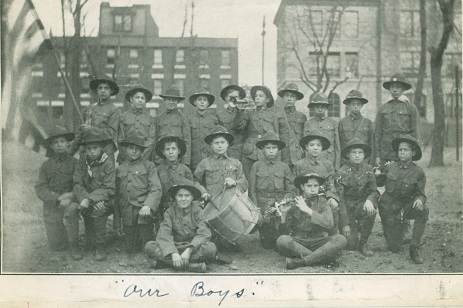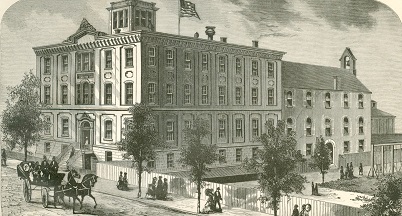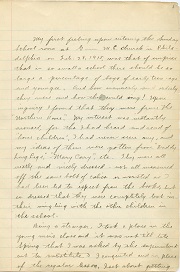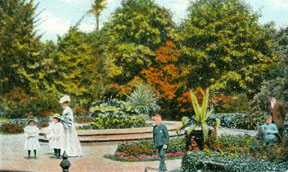
|
Keep Sweet! |
|
How the Lives of Philadelphia Orphan Boys and Their Teacher Were Forever Changed - A Memoir by the Late Dr. Roy Sheppard Minerd |
|
|
|
|
|
Dr. Roy S. Minerd |
Introduction: Dr. Roy Sheppard Minerd was a teacher and physician and an officer of our family's first annual reunion in 1913. Raised in Western Pennsylvania, he grew up in a church-going family, which prized education and the development of one's character. In September 1913, Roy moved to Philadelphia to enter medical school at what is now the University of Pennsylvania.
There, in addition to his studies, his life was forever changed when he met a group of troubled boys at the Northern Home for Friendless Children, an orphanage at the corner of 23rd and Brown Streets. This account, written between 1916 and 1919, and never before published, is a striking example of someone who lives his values outwardly, exemplifies personal responsibility and accountability, and provides a future of hope for young people who otherwise would have been lost.
A few insights into Dr. Minerd: He was the son of a Methodist preacher, and watched his father hold revivals and stir souls in mining towns around Connellsville and Uniontown, PA. He also was a college-degreed educator and had taught for several years, and knew something about how young people's minds work. He was married, but his wife and infant son were back home in Connellsville, and thus he was otherwise alone in Philadelphia and needed diversion from his studies.
~ Part 1 ~
|
|
|
The Northern Home for Friendless Children |
My first feeling upon entering the Sunday School room at G--- Methodist Episcopal church in Philadelphia on Feb. 28, 1915, was that of surprise that in so small a school there should be so large a percentage of boys of early teen-age and younger. And how mannerly and orderly they were and how they could sing!
Upon inquiry I found that they were from the "Northern Home." My interest was instantly aroused, for tho' I had heard and read of "home children," I had never seen any, and my ideas of them were gotten from "Daddy Long Legs," "Mary Cary," etc. They were all neatly and nicely dressed -- not all measured off the same bolt of calico or worsted as I had been led to expect from the books, but so dressed that they were completely lost in their mingling with the other children in the school.
Being a stranger, I took a place in the young men's class and it was not till late Spring that I was asked by the superintendent to substitute. I consented and in place of the regular lesson, I set about getting hold of those boys. I started a talk I had had prepared, on "The Greatest Boy That Ever Lived." But they didn't seem to care about him. The fussing was so general and the inattention so marked that I, after speaking several times of the disorder, stopped altogether and told the superintendent that under no consideration would I take those boys again unless things were different.
|
|
|
Page 1 of Roy's manuscript |
Later I understood the confusion. The young man who was their regular teacher, not being versed well enough in the bible to teach, or being indifferent, or both, had been, Sunday after Sunday, taking the lesson period for a discussion with the boys, of the baseball score, auto races, latest prize fight, etc., till they had been so diverted from the real purpose and spirit of the study period, that nothing else would satisfy. I substituted later for other teachers who had classes of Home boys but never had a repetition of that first day's experience.
Late in the Fall, I noticed that one of the chaps had a severe attack of blepharitis [eyelid inflammation], and found that nothing was being done for him. I spoke to Dr. L., superintendent of the Sunday School and he referred me to the superintendent of the Home. I told Prof. Fox, at the hospital, of the case and he said he would gladly treat him. I then went to the Home, making my first visit there and getting a great many impressions. I found that so much red tape would have to be measured before he could go to the hospital that I gave that up, but the move got him treatment at the hands of the nurse and the Home doctor, under which he made a rapid recovery.
Dr. W.G.J. of the G--- M.E. church used during the fall and winter to take the boys out for a hike every Saturday afternoon. One of the young fellows from the church said to me one evening: "If you want an afternoon of rare sport go out with Rev. J. when the Home boys and he go for a hike." So the first chance I had -- the first Saturday in March 1916, I went up to the parsonage only to find that Dr. J. could not go.
"You should have something definite arranged to keep them interested or you'll have trouble," he said.
"I have a lens with me and that to study the buds (which were swelling), their shapes, arrangement, etc., and also look for chrysalids and cocoons," I answered.
"The very thing!" he said. "I'll call up the Home and tell the superintendent you are coming," which he did.
|
|
|
Philadelphia botanical park of that era,
where |
Upon my arrival, I was greeted by Miss S, the superintendent who told me that the boys were not quite ready. I went back to the play room and there were about 40 boys about half of whom were hurrying to get started. I had been warned by Mr. J. not to take but a few if I had no help, but shortly we started off with about 25. "Started," I said, for two [town] squares from the Home all but nine had dropped into a hole and pulled it in after them.
Of course, I was worried but there was nothing to do but go on with those I had. We got to the Park shortly and began to notice buds, etc., the boys all becoming deeply interested. Then we went to the Fish House and aquariums and later saw the keepers feed the seals, after which we went home.
I reported conditions fully to Miss S. who I found had been there only three or four days and had come when her predecessor had left without a moment's notice, after permitting things to go to a stage little short of riot. There were over 100 children, the majority of whom were boys from eight to 16 years of age, with no one at the head of affairs, with caretakers who permitted the boys to go out at night and gave them keys to get back when they chose, pampered some, beat others -- I saw enough that first afternoon to understand the why and wherefore of several things. In justice to the management, I must say that Miss. McC., who had so badly managed, had been there in that or any capacity only a month or two. The children disliked her heartily and thought even less of their caretakers. The Sunday before she left, things got so bad that several officers were called in from the station house nearby to preserve order! Imagine it!
Talking it over with Miss S. that afternoon, she asked me if I could help or suggest someone who would help her quiet things down. I had many a time wished I might have an evening once in a while with those boys, and here was my chance.
| 'Things got so bad that several officers were called in from the station house nearby to preserve order! Imagine it!' |
"I'll do what I can so long as it does not conflict with my school work," I told her. "What would you suggest?"
"Anything you want to do will be all right," was her reply. I arranged to be there at seven the next morning.
The next afternoon I substituted again and among the boys was Bill E., whom I have mentioned as having the eye trouble. Bill has three brothers in the Home, all younger than he, and they come from a home of squalor and want. Bill waited to walk down Broad St. with me after the session and he was so full of the insurrection at the Home that he soon began a vivid description of the proceedings. I urged him on to tell me more of it, by seeming to think it was sport, and he told of tearing up the sheets, ripping open pillows and scattering the feathers over everything, breaking dishes and furniture etc., and disobeying all the rules they knew of just because of the wolf pack courage that their members and opportunities presented.
Next month: Roy takes Bill E. on a tour of the Philadelphia slums to show how poorly they compared with "the large beautiful buildings and grounds of the Home." Roy also begins a series of Sunday evening Bible classes and starts to inspire the boys with his messages.
Copyright © 2001 Mark A. Miner




